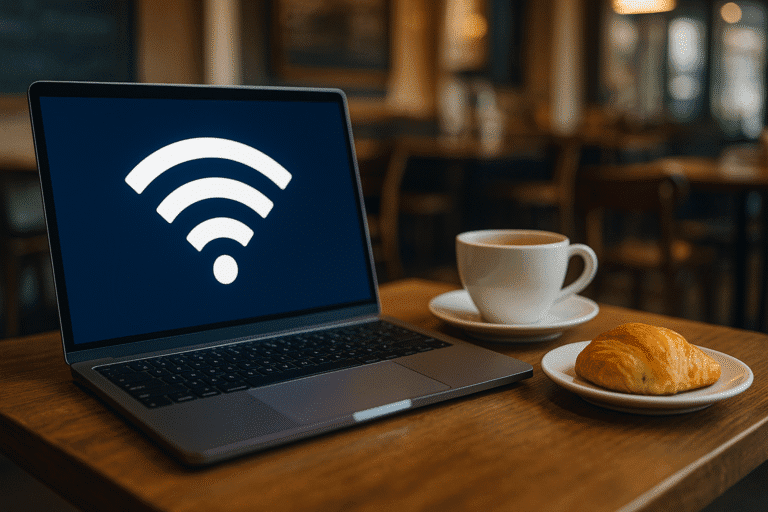
The Coffee Shop Trap: Free Wi-Fi, Real Risks
We’ve all been there. You’re at the airport, hotel lobby, or your favorite coffee shop. You connect to the “Free Wi-Fi” and boom—you’re online, caffeinated, and productive.
Free public Wi-Fi seems harmless—but it’s often far from safe. One of the biggest dangers of using public Wi-Fi is that it exposes your business data to cybercriminals without you even knowing.
And the worst part? You often won’t know you’ve been compromised until it’s too late.
What Hackers Love About Public Wi-Fi
To a cybercriminal, public Wi-Fi is like an open buffet:
Unencrypted connections make it easy to intercept traffic
Man-in-the-middle attacks let them eavesdrop or redirect you to fake sites
Spoofed networks (e.g. “FreeAirportWiFi”) trick you into connecting to the hacker instead of the venue
Once you’re connected, they can:
• Capture login credentials
• Access sensitive business documents
• Install malware or spyware
• Hijack your session (yes, even your email or bank)
This isn’t hacker fiction—it’s happening every day to travelers, remote workers, and even business execs.
Real-World Example: When Convenience Meets Catastrophe
It’s a common scenario: Someone connects to hotel Wi-Fi during a business trip. Moments later, a convincing pop-up appears—maybe a fake Microsoft login screen. It looks legitimate, so they enter their credentials.
And just like that, their account is compromised.
Incidents like this are a harsh reminder: Public Wi-Fi isn’t worth the risk without proper protection.
How to Stay Safe on Public Wi-Fi
1. Use a VPN (Virtual Private Network)
A VPN encrypts your internet traffic—making it unreadable to hackers, even on open networks.
We recommend NordLayer, ProtonVPN, or Cloudflare Warp for secure business-grade protection.
Want help deploying VPNs across your company? Contact us for endpoint management.
2. Avoid Accessing Sensitive Accounts
Skip online banking, tax software, or confidential business portals while on public Wi-Fi.
Wait until you’re on a trusted network—or use mobile data instead.
3. Turn Off Auto-Connect
Make sure your phone and laptop aren’t automatically connecting to unknown Wi-Fi networks.
4. Enable Two-Factor Authentication (2FA)
Even if a hacker gets your password, they can’t access your accounts without your 2FA code.
Use apps like Authy or Microsoft Authenticator.
5. Use a Mobile Hotspot
Your phone’s hotspot is often safer than public Wi-Fi.
It’s encrypted and under your control—just don’t forget to use a strong passcode.
For Business Owners: Protecting Your Remote Team
If your employees travel or work in coffee shops, airports, or client sites—this isn’t optional.
Make sure you:
• Deploy device-level VPNs company-wide
• Enforce secure DNS filtering (we can help!)
• Require endpoint protection software
• Educate staff with quick cybersecurity training
A few smart precautions go a long way in avoiding reputation damage, lost files, or compromised client from the data dangers of using public Wi-Fi.
Summary: Understanding the Dangers of Using Public Wi-Fi”
Public Wi-Fi might feel convenient—but behind that welcoming splash page could be someone watching.
When in doubt, don’t connect. Or at the very least, connect smart.
Let TechWyze Lock It Down
Want to roll out VPNs, better endpoint protection, or employee training? TechWyze helps small and growing businesses create secure, scalable IT strategies—without making tech feel overwhelming.
Schedule a free security consult
Or call us at 913-381-1333
Because your data deserves more than an “open network.”

